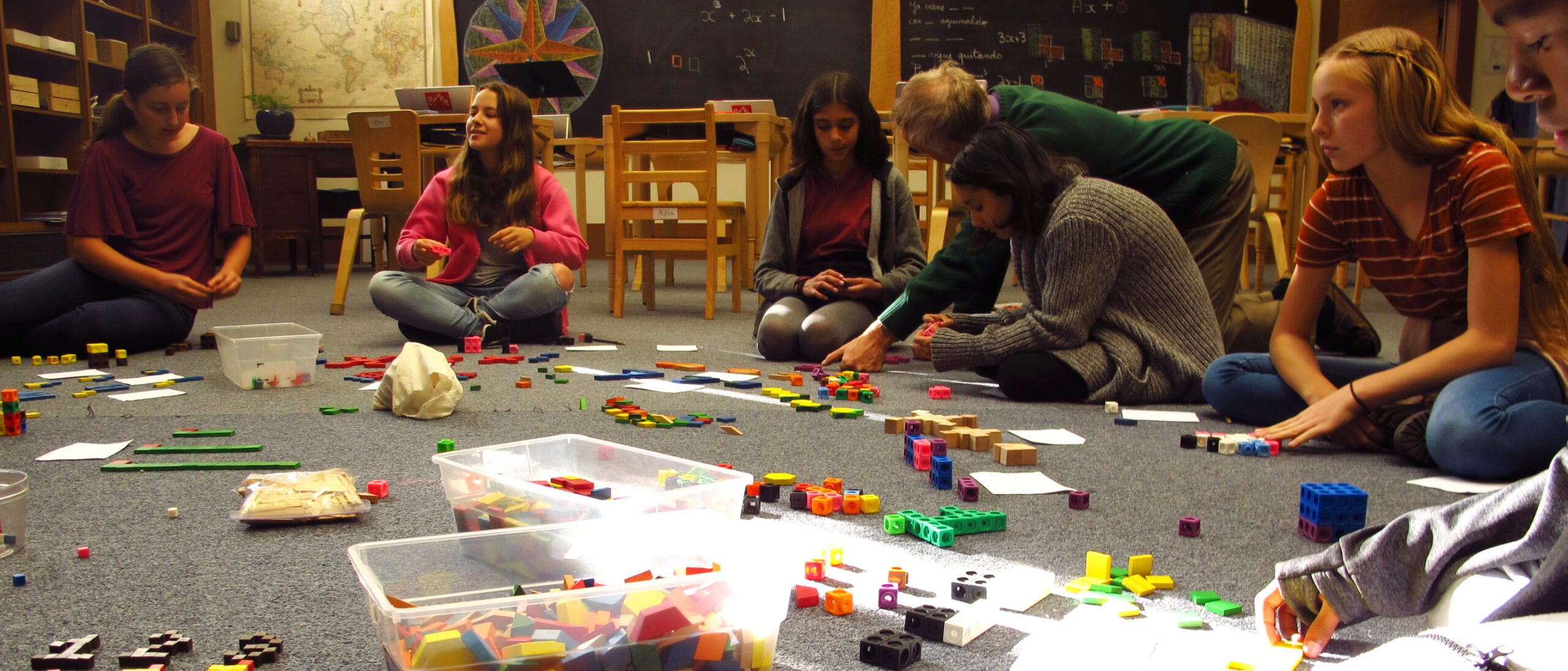Middle School
Program
Berkeley Rose middle school students continue focusing their studies through the Main Lesson, the cornerstone of Waldorf education. Main Lessons are taught in blocks based on one topic and usually last three to five weeks, for two hours a day. Block scheduling allows teachers and students to intensively focus on a particular academic area. Material is presented in a variety of styles; which allows for time to examine connections to other disciplines and to incorporate the arts. Each day, in addition to the Main Lesson, students have classes taught by specialized subject teachers culminating in a fully-rounded education that develops the whole child.

Middle School
Program
Berkeley Rose middle school students continue focusing their studies through the Main Lesson, the cornerstone of Waldorf education. Main Lessons are taught in blocks based on one topic and usually last three to five weeks, for two hours a day. Block scheduling allows teachers and students to intensively focus on a particular academic area. Material is presented in various styles, allows for time to examine connections to other disciplines, and incorporate the arts. Each day, in addition to the Main Lesson, students have classes taught by specialized subject teachers culminating in a fully-rounded education that develops the whole child.
Language Arts
Grade 6 |
Grade 7 |
Grade 8 |
| Research Reports Drama Creative Writing Active & Passive Voice Fact & Opinion |
Biography |
Novels Drama Note Taking Proofreading & Editing Research Project |
History & Culture
Grade 6 |
Grade 7 |
Grade 8 |
| Ancient Rome Medieval History World Geography |
The Renaissance The Reformation World Geography |
US History (1600-Present) World Geography |
World Languages
Grade 6 |
Grade 7 |
Grade 8 |
| Spanish | Spanish | Spanish |
Mathematics
Grade 6 |
Grade 7 |
Grade 8 |
|
Geometry |
Geometry |
Pre-Algebra & Algebra |
Science
Grade 6 |
Grade 7 |
Grade 8 |
|
Geology |
Chemistry |
Chemistry |
Music
Grade 6 |
Grade 7 |
Grade 8 |
| Orchestra Recorder Choral Singing |
Orchestra Recorder Choral Singing |
Orchestra Recorder Choral Singing |
Fine Arts
Grade 6 |
Grade 7 |
Grade 8 |
|
Watercolor Painting |
Watercolor Painting |
Watercolor/Oil/Mixed Media Painting |
Handwork
Grade 6 |
Grade 7 |
Grade 8 |
|
Sewing |
Hand Sewing |
Machine Sewing |
Eurythmy
Grade 6 |
Grade 7 |
Grade 8 |
|
Eurythmy |
Eurythmy |
Eurythmy |
Physical Education
Grade 6 |
Grade 7 |
Grade 8 |
|
Group Games with Refinement of Game Rule Development |
Group Games |
Group Games |
The seeds of academic rigor begin to germinate in 6th, 7th and 8th grade
6th Grade
The Child
Sixth graders are on the cusp of adolescence, and as such, they bring an increased capacity for critical thinking into the classroom. These students experience rapid physical growth and psychological change and often seek rules and causality to bring order to their new experience of the world. The student has an increased interest in social relationships. Once the sixth grader becomes more comfortable with these new developments, they are ready to look out into the world to discern their place, responsibility, and opportunities.
The Class
7th Grade
The Child
In many ways, seventh grade can be characterized as the year of looking ahead. Finally able to call themselves teens, these students are chomping at the bit, ready to join the world. Their horizons are expanding, and every day can be full of wonders. As the seventh grader moves into a new phase of growth, adolescence, they bring a new capacity for critical thinking to the subject matter at hand. These students are charged with emotional vitality and question everything around them. They seek to learn the boundaries of authority and the laws of science. The social experience of the class is also very important for the seventh grader.
The Class
The seventh graders enjoy an intensive study of the Renaissance, which brings all previous cultural achievements to a glorious flowering and ushers in a new age of wide scientific inquiry, exploration and discovery. Berkeley Rose students enthusiastically dive into this exploration and take this energy into their own studies of Africa, South America, and Asia. They are also met with new opportunities to explore the world around them through chemistry, physiology, astronomy, and physics.
8th Grade
The Child
As eighth graders actively begin to challenge the world around them, they study cultural and social revolutions, drawing upon themes of freedom versus equality, loyalty versus honesty – themes that often closely mirror the eight grader’s own inner growth. Another common thread throughout all instruction this year is helping students to learn to observe, to see for themselves and to draw their own conclusions. Observation involves becoming aware of our assumptions and learning to let them go. Only then are we truly thinking for ourselves. This fosters, in Berkeley Rose students, a sense of responsibility, as well as a confidence in their own powers of perception, thinking and decision-making.
The Class
Students in the eighth grade, at Berkeley Rose, immerse themselves in revolutions throughout history; from the American revolution, industrial revolution, India independence movement up through the Civil Rights movement in the United States. Our students dive deeply into the works of Shakespeare, which culminates in a class production. The scope of research, in all subjects, intensifies in preparation for entry into high school. Waldorf educated students move confidently into the years ahead with a drive and desire to ask compelling questions that will continue to fuel their love of learning in high school, college and life.
Berkeley Rose seeks a diverse community, welcoming students of any race, religion, ethnic, and financial background. It does not discriminate on the basis of race, color, national, or ethnic origin in the administration of its educational or admissions programs and policies. The school is a nonprofit 501(c)(3).



